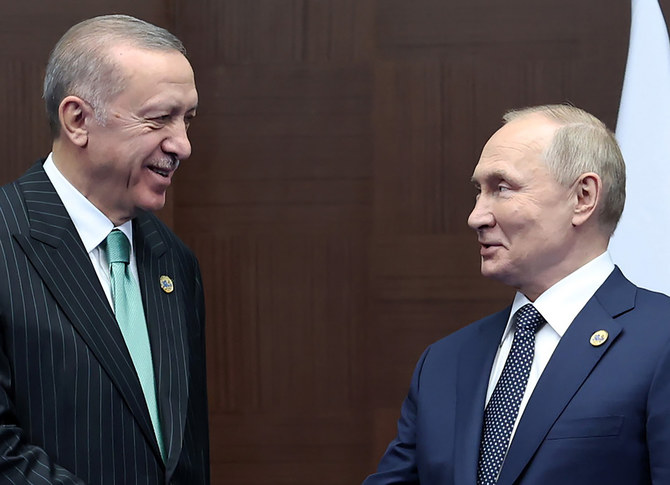ANKARA: After the conclusion of the NATO summit, the spotlight has shifted to the delicate relationship between Turkiye and Russia, particular in the wake of Ankara’s decision to drop its opposition to Sweden’s accession to the multi-nation defense body, that has drawn sharp criticism from Russian propagandists.
This move by Turkiye is a departure from its previous balancing act between the West and Russia, especially in light of Moscow’s unwarranted aggression against Ukraine. However, analysts believe that this development would not significantly impact relations between the two nations because of mutually beneficial economic ties.
Since Tuesday, Russian media houses have wasted no time in criticizing Turkiye and President Recep Tayyip Erdogan’s leadership, even questioning the reliability of Ankara’s friendship.
Viktor Bondarev, the head of the Russian Federation Council Committee on Defense and Security, accused Turkiye of gradually transforming from a neutral country into an unfriendly one, equating its behavior to a betrayal.
“The events of the past weeks, unfortunately, clearly demonstrate that Turkiye is gradually and steadily continuing to turn from a neutral country into an unfriendly one,” Bondarev told state media TASS. He added that Turkiye’s actions equate to “a stab in the back.”
Moscow’s recent anger has been fueled by Turkiye’s decision to repatriate Ukrainian soldiers captured by Russia in the Azov region, despite promising not to do so until the end of the war.
This move followed a meeting between Ukraine’s President Volodymyr Zelensky and Erdogan earlier this month.
The five Ukrainian soldiers, who were part of the Azovstal defense in Mariupol, surrendered after the fall of the city and were taken to Turkiye as part of a prisoner swap agreement. According to the agreement, they were supposed to remain in Turkiye until the war ended.
Pro-Kremlin TV host Olga Skabeeva criticized Erdogan for failing to notify Russia in advance about the Azov prisoner release.
Experts point to Turkiye’s continuous support for Ukraine’s NATO accession and its construction of a drone factory in Ukraine as the main sources of disagreement between Ankara and Moscow. Ukraine has begun construction of the Bayraktar TB2 drone manufacturing plant — a crucial step to boost Kyiv’s fight against Russian aggression. The factory followed a deal between Ankara and Kyiv in February to cooperate in high-tech and aviation industries.
Russian propagandist Sergey Mardan dismissed Turkiye’s geopolitical influence and highlighted the country’s weakening economy.
He claimed that Turkiye sees Russia as a powerful ally and expressed regret that Moscow had supported Erdogan’s re-election.
On Wednesday, Erdogan held a press conference where he announced that Sweden’s NATO accession ratification could take place in October or even sooner.
He also stated that the decision to release the Azov commanders was for a reason.
Erdogan expects to have a face-to-face meeting with Russian President Vladimir Putin in August to discuss these issues.
On Tuesday, Kremlin spokesman Dmitry Peskov responded to a question about Turkiye’s decision to lift its opposition to Sweden, and said Ankara should be under no illusion that it might one day be permitted to join the EU.
“No one wants to see Turkiye in Europe, I mean the Europeans. And here our Turkish partners should not wear rose-tinted spectacles either,” he said.
Peskov, however, emphasized Russia’s preference for maintaining cordial ties with Ankara despite divergences, including those over NATO enlargement.
According to Sinan Ulgen, a former Turkish diplomat and chairman of the Istanbul-based think tank EDAM, Turkiye’s pro-Western moves have indeed had an impact on Moscow.
“This is really an indication that how reliant Moscow became on Turkiye, the only NATO country with which it has high-level dialogue and not imposed sanctions,” he told Arab News.
“Turkiye is still a vital outlet for Russia. There is an asymmetric relationship between Turkiye and Russia that has greatly benefited the Turkish side since the start of the war. That calculus explains the lack of reaction from Russia,” said Ulgen.
Moscow is also trying to build a new energy hub in Turkiye to facilitate its gas exports in response to European projects to reduce reliance on Russian energy.
Ulgen anticipates that Turkiye would make further pro-Western gestures, such as providing protection to ships involved in the Grain Deal that allows Ukraine to export the commodity via the Black Sea.
“If Russia withdraws from the deal, it would send a strong message,” he said.
While Ankara and Moscow disagree on various policy areas, experts predict that they will continue to cooperate where their interests align.
Soner Cagaptay, a senior fellow at The Washington Institute, suggests that Turkish foreign policy would remain transactional and pragmatic, rather than undergoing a major shift.
“Erdogan is likely to leverage this opportunity to establish closer ties with US President Joe Biden and is eyeing a visit to Washington,” Cagaptay told Arab News.
“This as a charm offensive aimed at securing benefits such as the deepening and modernization of the Customs Union with the EU and restoring market confidence in the Turkish economy,” he said.
“In the end, it is not a foreign policy pivot. It is a recalibration of economic reality to make Turkish economy more independent. The relationship will continue to be influenced by economic realities and strategic considerations,” Cagaptay added.
To what extent Turkiye will be able to balance its relationship with Biden and Putin is still unclear. In a surprise tweet on Wednesday evening, Biden thanked Erdogan for his “courage, leadership and diplomacy.”
“This summit reaffirms our commitment to the NATO defense, and I hope we can continue to make it even stronger,” he added.




















